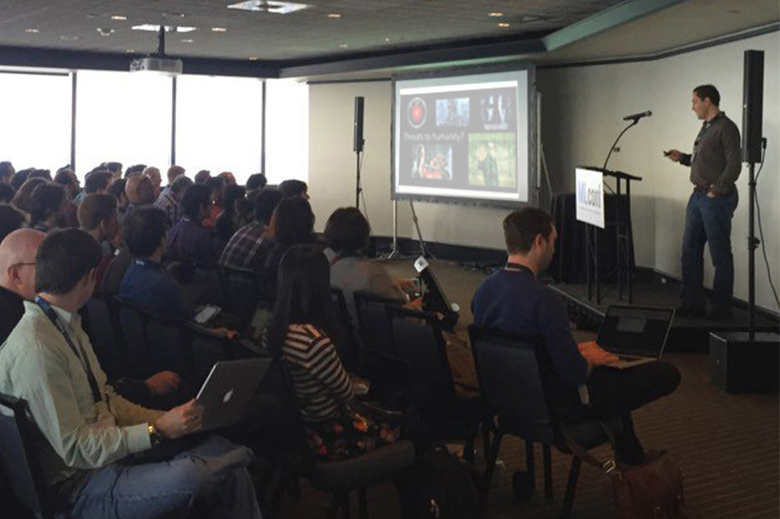Quora Knowledge Prize winner Igor Markov presents winning answer to packed house at MLConf
Prof. Markov is a frequent contributor to Quora, where his contributions cover subjects ranging from computer science to geopolitical affairs.

 Enlarge
Enlarge
Prof. Igor Markov was a featured speaker at the ML Conference, which took place May 20, 2016 in Seattle.
His talk, entitled “Can AI Become a Dystopian Threat to Humanity? A Hardware Perspective,” expanded on his answer to a Quora question on preventing AI from becoming a dystopian threat to humanity that won a Knowledge prize and another answer regarding how to identify chatbots. In the talk, Prof. Markov suggested a series of measures to partition and contain the power of AI, from introducing boundaries between different levels of intelligence to limiting self-improvement or self-replication.
Prof. Markov is a frequent contributor to Quora, where his contributions cover subjects ranging from computer science to geopolitical affairs. He has over 35,000 followers on Quora. You can see his past Quora activity or follow him here.
Prof. Igor Markov received his M.A. in Mathematics and Ph.D. in Computer Science from UCLA. Since joining the University of Michigan faculty in 2000, his research has included computers that make computers (software and hardware), secure hardware design, combinatorial optimization with applications to the design, verification and debugging of integrated circuits, as well as in quantum logic circuits. New algorithmic techniques developed by Prof. Markov have been implemented in open-source projects and industry tools, leading to order-of-magnitude improvements in practice.
Prof. Markov has coauthored five books and more than 200 refereed publications, some of which have been honored by best-paper awards. He is the recipient of a DAC Fellowship, an ACM SIGDA Outstanding New Faculty award, an ACM SIGDA Technical Leadership Award, an NSF CAREER award, an IBM Partnership Award, a Synplicity Inc. Faculty award, a Microsoft A. Richard Newton Breakthrough Research Award, and the inaugural IEEE CEDA Early Career Award. He is an ACM Distinguished Scientist. He was also honored by the University of Michigan with the EECS Department Outstanding Achievement Award.
 MENU
MENU 
